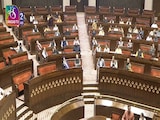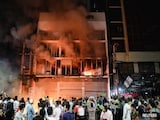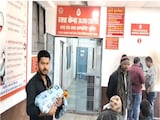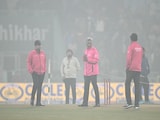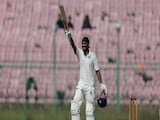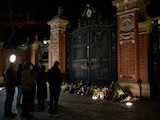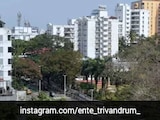The announcement of voting rights for non-locals in Jammu and Kashmir has put the lives of migrant workers and minorities at risk, political parties in the union territory said on Monday.
An all-party meeting called by Farooq Abdullah over the issue discussed the security fallout of the controversial move and expressed fears that there may be terrorist attacks on non-local workers in Kashmir.
"We fear there will be attacks on migrant workers," said Farooq Abdullah after the conclusion of the all-party meeting in Srinagar.
The meeting at Mr Abdullah's residence was attended by the Congress, Peoples' Democratic Party, Shiv Sena, Janata Dal (United), the Left and other local parties in Kashmir.
"They should have thought about it before making such a move. But they didn't," said Mr Abdullah, a former Chief Minister of Jammu and Kashmir.
Non-local Hindus, Kashmiri Pandits and migrant workers - both Muslims and Hindus - have become victims of targeted attacks for the last two years in Kashmir.
The attacks began after the union government abolished the permanent resident certificate in Jammu and Kashmir and started issuing domicile status to non-locals working and living in the union territory.
Before the revocation of Articles 370 and 35A, only permanent residents of Jammu and Kashmir were eligible to vote in assembly elections and enjoyed special privileges in jobs and land ownership rights in the erstwhile state.
All that was changed after Jammu and Kashmir was turned into a union territory and had its special constitutional status revoked on August 5, 2019.
Since then, locals have become increasingly sceptical of every move the central government takes on Jammu and Kashmir. Terrorist groups have tried to exploit the fears and justify targeted attacks on innocent people.
For more than four years now, the former state is without an elected government. But even if elections were to be held, there is little hope for change because in a union territory, as seen in Delhi, the real power rests with the centre's representative the Lieutenant Governor.
And there is little clarity on when elections will be held in Jammu and Kashmir. So far, the polls have been delayed multiple times.
The process of redrawing assembly constitutes has already become controversial, and its genuineness is questioned. There are allegations of gerrymandering and brazen discrepancies in allotting seats on considerations other than population as the sole criteria.
The opposition alleges it was done to turn a demographic majority into a political minority to help a political party. The BJP, which governs at the centre and controls Jammu and Kashmir, has rejected the allegations.
Last week, Jammu and Kashmir's Chief Electoral Officer said that following revocation of Article 370, non-locals who are ordinarily living in the union territory can register as voters and eventually over 20 lakh new voters will be added.
Following an outcry, the Jammu and Kashmir government tried to contain the resentment. In advertisements published in local newspapers, the government termed it a misrepresentation of facts spread by "vested interests".
But the opposition remains unconvinced and has said the government is trying to import voters to influence the elections.

